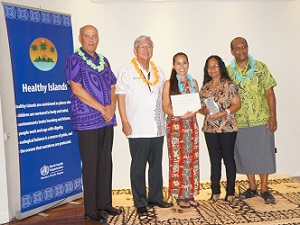
As part of the Eleventh Pacific Health Ministers Meeting, the World Health Organization (WHO) awarded four innovative projects in Commonwealth of the Northern Mariana Islands, Samoa, Tokelau and Vanuatu with the WHO Healthy Islands Recognition for the outstanding work by health and community leaders in the Pacific.
Healthy Islands are where:
- children are nurtured in body and mind;
- environments invite learning and leisure;
- people work and age with dignity;
- ecological balance is a source of pride; and
- the ocean which sustains us is protected.
Supported by the Ministry of Health and Welfare of the Republic of Korea, the recognitions honour community-based actions, partnership efforts and governmental support for Healthy Islands initiatives.
“We present the WHO Healthy Island's Recognition Awards at each Pacific Health Ministers Meeting. I began this custom during my first term in 2011. I am pleased to see the enthusiasm and innovation the awards have fostered” said Dr Shin Young-soo, WHO’s Regional Director for the Western Pacific as he distributed the awards.
There are many creative developments and good practices for Healthy Islands across the Pacific. These awards particularly recognize community-based actions and efforts, partnership efforts, and governmental support for Healthy Islands initiatives. The awards were in two categories.
Best proposal recognition
The recognition for Best Proposal is given for work proposed in the areas of community-based efforts or multisectoral engagement. The winners were:
- Scale up sanitation improvements in schools and health and facilities in Sanma province" (Ministry of Health, Vanuatu) through introduction of a new design for improving ventilation in pit toilets, which involved the community, civil society and the Ministry of Health.
- "Non-communicable diseases (NCDs): early detection and management through community participation" (Ministry of Health, Samoa) which focuses on prevention and community empowerment for NCDs prevention and management.
Best practice recognition
The recognition for Best Practice is given for work already in progress or recently completed in one or more of three areas: community-based efforts; multisectoral engagement; and governmental support. The winners were:
- "Fizzy drink free" (Department of Health, Tokelau) is a policy initiative that demonstrates strong community leadership and action to prevent the importation of fizzy drinks.
- "TASA role models" (TASA non-governmental organization, Commonwealth of the Northern Mariana Islands) is a community-based, role-models approach that has been highly successful in changing the environment, policy and people's attitudes.
In May 2010, Pacific Health Ministers agreed to establish the "WHO Healthy Islands Recognition Programme" at the First Healthy Islands Forum held in Geneva prior to the Fifty-fourth World Health Assembly. The WHO Healthy Islands Recognitions are intended to encourage Pacific island countries and areas, as well as communities, to continue to innovate and demonstrate effective and efficient ways of promoting and protecting the health of their populations.
WHO will continue to nurture innovation and community-based approaches through this biennial award and encourage the sharing of good practices so that citizens of Pacific island countries can achieve and enjoy the Healthy Islands vision.
"The Healthy Islands vision continues to be a beautiful expression of where we need to be heading," said Dr Shin. "Working together, we can make the Healthy Islands vision a reality for our children."

/59748.tmb-300v.png?sfvrsn=9885965b_2)


